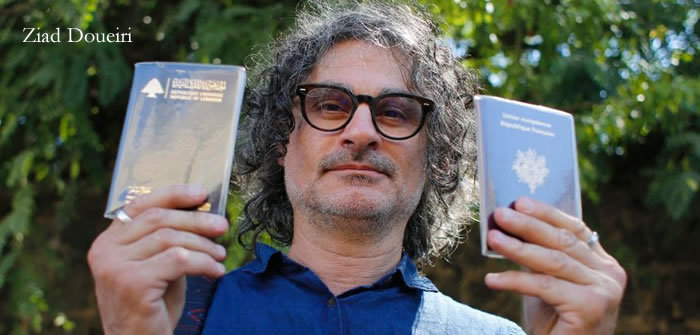 Nurbek Egen, a filmmaker from Kyrgyzstan, graduated from the Institute of Art in Bishkek and then went to VGIK to study film direction. Nurbek started his career as a film director by making two short films and a documentary. “The Wedding Chest” is Nurbek’s first feature film.
Nurbek Egen, a filmmaker from Kyrgyzstan, graduated from the Institute of Art in Bishkek and then went to VGIK to study film direction. Nurbek started his career as a film director by making two short films and a documentary. “The Wedding Chest” is Nurbek’s first feature film.
Wedding Chest is the story of Aidar who has left his Kirghiz mountain village and now lives in Paris with his French girlfriend, Isabelle. Aidar takes Isabelle for a visit to his home town. Aidar has changed but everything at home has remained the same. The relatives and neighbors are just as he left them, living their traditional life style. Aidar’s mother, who expects his son to get married, has already prepared a wedding chest filled with gifts for his future bride. Both Aidar and Isabelle are facing complex cultural clashes that test their love.
Bijan Tehrani: What inspired you to make “The Wedding Chest”? Dealing with the issue of a cultural clash? 
Nurbek Egen: Like my hero, Aidar, I was born and grew up in the backwoods, and then I moved into the big city, Moscow, where I was forced to ignore the traditions and customs of my people and of my parents who brought me up in keeping with these traditions. Sometimes I have to lie in order not to mortify them. But always I felt myself between two worlds, between two cultures, between East and West. At the same time it seems to me that the situation in the film is understandable to one and all. Many children all over the world leave their homes when they grow up either to get an education or a job. They get immersed in another culture and come back home as strangers. Grown-up children don’t want to quarrel with their parents or shirk traditions; however they want to remain true to themselves.
 Bijan: The main character of The Wedding Chest is an immigrated man coming back for a visit. Was there a certain reason to choose this character?
Bijan: The main character of The Wedding Chest is an immigrated man coming back for a visit. Was there a certain reason to choose this character?
Nurbek: As I said that the film is almost autobiographical. Aidar is very close to me. At home, Aidar is one type of person. In a big city, he is quite different. In the picture, this inner discord comes to the surface because the man is placed in circumstances in which he has to make a choice.
Bijan: Is “The Wedding Chest” in a way the story of Kyrgyzstan today? How far this movie helps the audience to understand the life and culture of Kyrgyzstan?
Nurbek: Not really. It’s more fiction. Although the problem of Aidar is a problem of many young people today What happened in ‘The Wedding Chest’ could have happened to anyone who one fine day decided to break away from his family and his roots, leave the place where he grew up and set out in search of money, fame, career or a lucrative marriage. This story is about what forms the moral foundation of our lives whether we like it or not, whether we admit it or deny it. The story is 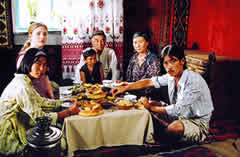 repeated century in and century out and ends only to be repeated again because it deals with such eternal phenomena as tradition, memory of ancestors and moral choice.
repeated century in and century out and ends only to be repeated again because it deals with such eternal phenomena as tradition, memory of ancestors and moral choice.
Of course, we tried to show in our film the life, culture and traditions of my country. For example, in Kyrgyzstan, where they set great store by tradition, they begin to prepare for a child’s wedding immediately after it is born. Right up to the wedding day, while the child is growing up, the parents collect a dowry for it in a huge chest, so that by the time the wedding day comes round it is full of all kinds of things – ornaments, clothes, money. Symbolically, the young couples start a new life emptying the chest for the needs of their home and their children and then start filling it again for the next generation. A people who have preserved their traditions are worthy of respect. Thanks to them new generations remember their ancestors and the best of what history has selected. In our film we wish to say that there are no bad or good worlds, righteous or ignoble lives, traditions that are useful or useless. All have the right to existence and we must have the ability to discover the new every day but never forget about the old that others had discovered for us centuries ago.
Bijan: Aidar is a young Kyrgyz and Isabella a modern French woman. You expect when both of visiting Kyrgyzstan, find Aidar happier and more relaxed than Isabella, but in your movie, you find it the opposite. Why is that? 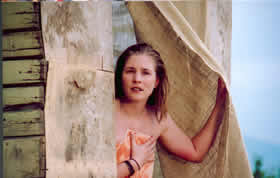 Nurbek: Because he hasn’t enough courage to break the news about Isabelle and himself. He doesn’t want to upset his parents who want, according traditions, him to be married with the Kyrgyz girl. It’s bad if he does not speak out but if he does he will make his dear and near ones sad.
Nurbek: Because he hasn’t enough courage to break the news about Isabelle and himself. He doesn’t want to upset his parents who want, according traditions, him to be married with the Kyrgyz girl. It’s bad if he does not speak out but if he does he will make his dear and near ones sad.
With every passing day it grows more and more difficult for him to tell the truth. Isabelle cannot understand why she and her fiancé live in different houses. Back in his own country Aidar changes because he cannot behave as he did in the West. In the mountains he is the son of his parents and has to respect the traditions of his people. According to an ancient family legend, many centuries ago the youngest son of the Khan, who was the forebear of their clan, disobeyed his father and violated his people’s sacred traditions and became a pariah. The image of the unhappy youth constantly arises in Aidar’s mind. To make matters worse, the postman Yusup, a grim custodian of tradition, keeps reminding him of his duty to the clan all the time. Isabelle is much opened girl; she immediately finds common understanding with everybody in the village and happy here until she understands that Aidar behaves like a coward.
Bijan: The growing and interesting relationship between Isabella and Aidar’s mother, while they don’t understand each other’s language, is very interesting, how do you describe this? Also it seems that Aidar may share some of the values that his father believes, but it does not seem that they have a deep relationship. Was I right in my understanding?
Nurbek: These two women understand each other without words, because they are good-hearted, besides they love the same man – Aidar. As for relationship 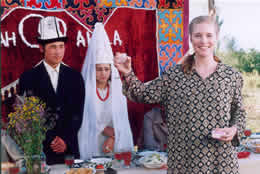 between father and Aidar, they are deep but in Kyrgyz families the most important person for children is mother. The woman is always responsible for the family, the children. That’s why Aidar first tells his secret to father – he is afraid his mother more, he respects her and afraid to upset. Aidar found a woman with whom he wants to spend the rest of his life. That is the most important thing. His father is simply a stubborn old man who doesn’t want to lose his son. He wants Aidar to be near him, not somewhere in France but at home because he has pinned all his hopes on him.
between father and Aidar, they are deep but in Kyrgyz families the most important person for children is mother. The woman is always responsible for the family, the children. That’s why Aidar first tells his secret to father – he is afraid his mother more, he respects her and afraid to upset. Aidar found a woman with whom he wants to spend the rest of his life. That is the most important thing. His father is simply a stubborn old man who doesn’t want to lose his son. He wants Aidar to be near him, not somewhere in France but at home because he has pinned all his hopes on him.
Bijan: I believe that you touch the matter of culture clash in an excellent way, you show that young people going back to the countries with an old culture and tradition have more problems getting along with people comparing to an understanding stranger.
Nurbek: Yes, that’s true. For example, the postman Yusup for Isabelle is just the funny and strange man, but for Aidar he is much more. Yusup is a complex character. He is a loner. He doesn’t trust anyone. He is not malicious and is very educated. Envy is not the reason for his dislike of Aidar. The reason is his protest against his violation of the traditions of their ancestors which Yusup holds sacred. He cannot stand the situation and believes he is right. He warns Aidar to think well, but in the end his hard feelings overwhelm him and he attempts to shoot Aidar.
Bijan: What were the challenges you faced while making “The Wedding Chest”?
Nurbek: The challenge for me was to work with the international crew (it was my first full-length feature and it was the co-production between Kyrgyzstan, Russia, France and Germany), with the wonderful French actress Natacha Regnier (not knowing any word in French).
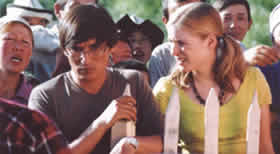 Bijan: What are your plans for international distribution of “The Wedding Chest”?
Bijan: What are your plans for international distribution of “The Wedding Chest”?
Nurbek: I’d like very much our film to be screened in movie theatres in different countries, on big screens in order views could see all the beauty of my native land. We have “Seven Arts” by Peter Hoffman as the world sales agent and hope for the good international distribution.
Bijan: What did lead you to become a filmmaker?
Nurbek: When I was a young boy, I’ve read books by Chinghiz Aitmatov, great Kyrghyz writer, I saw many films made after his novels and stories and I admired them. I saw films by Tolomush Okeev, Bolot Shamshiev – Kyrgyz cinema had glamorous history – and I wanted to become one day a filmmaker like them. I heard about VGIK – famous cinema school in Moscow – and I, simple boy from the distant Kyrgyz village, dreamt about this school where Andrei Tarkovsky, Alexander Sokurov, Vasily Shukshin, Nikita Mikhalkov studied. And once my dream became true – I entered the VGIK and studied at the workshop of Vladimir Khotinenko.
Bijan: Who are the filmmakers that you admire?
Nurbek: Emir Kusturica and Wong-Kar-wai.
Bijan: Please tell us about your future projects.
Nurbek: I’ve just finished the film “The Net” for the Russian TV (12 series), and now I am writing the script for my next feature “The House”. It’ll be the story about the young Kyrgyz couple who are looking their place on earth and in the end find it at home.

